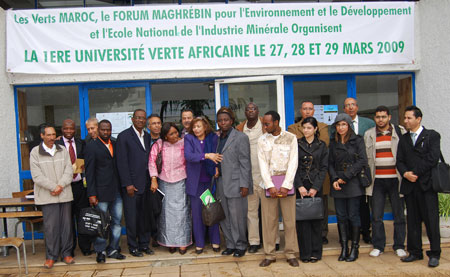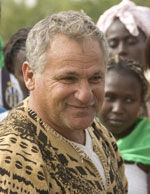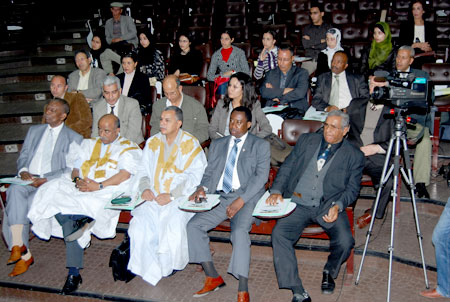First African Green University held in Morocco
Share
by Mike Feinstein, International Committee of the Green Party of the United States
“Can ecology save Africa?” and “What role will African Green Parties play?” These themes brought to≠gether more than 50 regional Green representatives from Morocco, Nigeria, Rwanda, Burundi, Niger, Mali and Guinea-Conarky to Rabat, Morocco for the First African Green University, March 27th-29th. †Foreign Embassies in Morocco from Gunea Bissao and Democratic Republic of Congo were also represented.
Organized by the Moroccan Greens and the Maghreb Forum for Environment and Development, the three-day conference featured workshops on topics from climate change, good governance and democracy, to the effect of the global financial crisis on Africa.

Participants at the African Green University, Rabat, Morocco, March 27-29, 2009
The Green University was conceived in April 2008 as an organizing tool for African Greens, coming out of discussions at the African Greens Conference held in Sao Paulo, Brazil, immediately preceding the Global Greens Second Congress. There it was agreed that sub-regional Green Party federations would be established across Africa for the next two years, followed by an African-wide Green Congress, which has now been scheduled for March 2010 in Kenya. The Green University in Rabat was a step towards building a sub-regional federation in the north of Africa.
On the day’s opening session, Fatima Alaoui, general secretary of the Morocco Greens, shared the challenges of Green organizing in her country. The Green Party there was founded in June 1992 and is officially known today as Le Parti des Verts pour le DÈveloppementóthe Party of Greens for Development.
In 2002 and again in 2006 the Greens submitted their party statutes and other required registration documents to become an official national party, but the Interior Ministry that handles elections refused to issue them ëreceipts’ (official recognition) in other than a few localities. In response, Green University delegates passed the following “Rabat Declaration” (see box). If the Greens gain national party status, they hope to win seats for the first time in the 325-member Assembly of Representa≠tives in 2012.
Others making presentations about the status of Green politics in Africa and beyond included two of Africa’s three representatives on the Global Green Coord≠i≠nationóAdamou Garba (Niger) and Frank Habineza (Rwanda), both whom proceeded afterward to Tunisia on a fact finding mission about Green parties there. On the final day a panel discussion focused on the issue of chemical weapons used by the Israeli army against civilian populations and children in Gaza; and Alaoui received an award in recognition of her work in support of children there.
Greens win regional seats in Senegal
On March 22nd, Greens known as the FÈdÈration DÈmocratique des Ecologistes du SÈnÈgal (FEDES) won approximately 100 seats in local elections across Sene≠gal, concentrated in the suburbs of the capital city Dakar, as well as in other regions.
 Perhaps the biggest victory was that of Haidar El Ali, who was elected second vice-president on the Dakar Regional Coun≠cil. The Dakar rÈgion encompasses the city of Dakar and all its suburbs along the Cape Verde Peninsula; and the Regional Council has extensive powers to manage economic development, transportation and environmental protection issues at the regional level, and thus, to coordinate the actions of the communes below them. A long-time defender of the marine environment, El Ali will be vice-president in charge of environmental affairs.
Perhaps the biggest victory was that of Haidar El Ali, who was elected second vice-president on the Dakar Regional Coun≠cil. The Dakar rÈgion encompasses the city of Dakar and all its suburbs along the Cape Verde Peninsula; and the Regional Council has extensive powers to manage economic development, transportation and environmental protection issues at the regional level, and thus, to coordinate the actions of the communes below them. A long-time defender of the marine environment, El Ali will be vice-president in charge of environmental affairs.
Elsewhere, a Professor of Interna≠tional Law at UniversitÈ Gaston Berger in Saint Louis and a well-known Green organizer Papa Meissa Dieng was elected to a position inside the mayoral office in Diurbel, a city of 100,000 about 145 kilometers east of Dakar.
First Town Hall run by Greens in Mali
On April 26th, the Parti Ecologiste du Mali (Ecologiste Party of Mali) group from the Mali-URD (Union pour la RÈpublique et la DÈmocratie or Union for the Republic and Democracy) won nine seats out of 11 in Tienfala, a town of about 4,200 on the Niger River in the south-west of Mali, about 30 kilometers from the capital city of Bamako. Among these nine, four Green municipal candidates were elected, including the mayor.
According to the party President, Diallo Fadimata Bintou Toure, †”Tienfala is the first local government district to be run on Greens ideas, positions and means. Because of this, and given the geographical position of our country, we intend to make Tienfala the general headquarters of the Party and a meeting place for Greens in West Africa.”
The significance of this choice cannot be overstated because in some ways, Tienfala is a microcosm of environmental issues facing Mali and much of Africa. One of the poorest nations in the world, Mali ranks 175 out of 177 in the United Nations Development Report 2006. Two thirds of the country is covered in desert and this harsh environment is deteriorating further as rainfall is decreasing. Sixty percent of Mali’s population lives below the poverty line and only between 30 per≠cent to 50 percent have access to clean water. As a result, water-related diseases are common and child mortality is very high.
At one point, the situation in Tienfala was so bad more than 5,000 people left the village to escape the blinding effects of trachoma and river blindness resulting from contaminated water, leaving it virtually deserted. Even government representatives were unwilling to be posted there because of these diseases. Now the Greens hope to be part of the ecological and social rejuvenation of the town and the region.
Greens politics to save Africa – Invitation to the First African Green University
University in Morocco will allow the scientific community to discuss the current state of ecological knowledge on saving Africa and identify major research needs for future projects, in order to coordinate African Greens’ collective action to establish a South-South cooperation and an egalitarian partnership with the North.
Currently Africa is a continent where neo-liberal globalization has had very dramatic consequences: famines, epidemics, civil wars, deforestation and desertification, human rights infringements, relocation of polluting industries, toxic waste dumping etc.
What alternative Green politics can we offer to save Africa and stop the rest of the world pillaging Africa’s human and natural resources? How will African Greens Parties and non-governmental organizations view proposals of good governance and democracy and true participative and sustainable development? This meeting aimed to bring together international, Eur≠opean and Maghreb expertise to perfect technological progress in environment and ecology. Researchers and professionals had an opportunity to establish an agenda of scientific and cultural exchange.

Attendees at the African Green University




